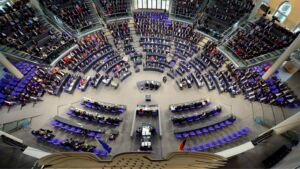Merely a week ago German Foreign Minister Annalena Baerbock claimed that the country’s armed forces have said it “can no longer supply weapons from its own reserves” to Ukraine. But with Berlin coming under immense pressure from NATO allies, particularly the United States after Chancellor Olaf Scholz voiced fears of sparking a WW3 nuclear showdown scenario with Russia, Germany’s tune quickly changed.
On Thursday lawmakers in the Bundestag, Germany’s lower house of parliament voted overwhelmingly to approve sending “heavy weapons and complex machinery” to Ukraine. According to national media it passed with 586 votes in favor, 100 against, and seven abstentions.
The bulk of those voting “no” included the right-wing Alternative for Germany (AfD) party, citing that the move feels close to a “declaration of war”. Senior AfD lawmaker Tino Chrupalla spelled out that it “could make us party to a nuclear war.”
Though this view is now being dismissed as merely excuse-making by the “far-right”, Chancellor Scholz himself said the same thing in a Spiegel interview published last Friday…
“We need to do everything to avoid a direct military confrontation between NATO and a heavily armed superpower such as Russia, a nuclear power,” the chancellor said at the time. “I will do everything to avoid an escalation that could lead to World War III – there can be no nuclear war.”
It was only days after this interview that Berlin signaled a complete reversal, with the German Ministry of Defense announcing Tuesday that delivery of Gepard anti-aircraft tanks to Ukraine had been approved. However, it could take up to a year or more for Ukrainian forces to be properly trained in the effective deployment and use of the Gepard systems.
Thursday’s vote represents what appears to be Berlin’s new commitment to a policy of ‘open-ended’ arming of Ukraine – much like the United States of late. Deutsche Welle details the types of weaponry and assistance that Ukraine can expect to receive based on Thursday’s Bundestag vote:
In addition to heavy weapons, such as anti-aircraft systems and armored vehicles, the measure passed by German MPs included provisions for sending heavier equipment to eastern NATO allies as well.
Military aid should continue and accelerate wherever possible, according to the proposal backed by the ruling coalition and the biggest opposition party, the conservative Christian Democrats (CDU).
Germany will also deploy more soldiers to boost NATO presence in eastern Europe, and encourage Russian soldiers to lay down their arms and seek asylum in Germany and the EU.
Additionally, the measure foresees an appeal to China for it to “abandon its acceptance of war” and actively support a truce.
But as for calling on China to “actively support a truce” – we wonder the degree to which this is also the active stance of NATO countries at this point, who seem to be rushing headlong toward escalation given the now constant ramping up of weapons shipments to Kiev.
The Kremlin quickly voiced its anger and condemned the vote…
In light of this, it’s worth revisiting some of Scholz’s own words from last week: “To avoid an escalation towards NATO is a top priority for me,” and “That’s why I don’t focus on polls or let myself be irritated by shrill calls. The consequences of an error would be dramatic.” Despite Germany’s complete reversal, this is still truer than ever.

